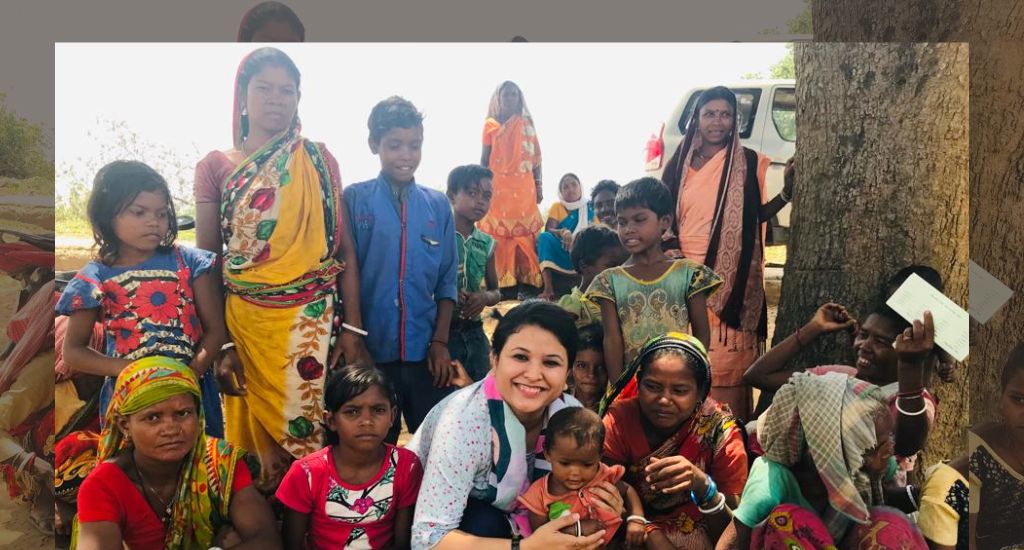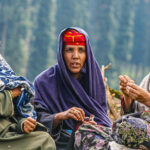Village Square: Working on the frontline of child trafficking must be incredibly hard on many levels – but is it also rewarding?
Shrishti: My work is risky at times. Often the raids (to rescue children) happen late at night and there’s always the fear of something untoward happening.
But there are quite a few things that I absolutely love about my work. I’m adventurous. I love going for raids and rescues with the police team. Especially rescuing the kids.
My colleague and I recently (June 2022) rescued ten boys who were being taken to Andhra Pradesh to work in a factory. But there were challenges – like no shelter homes for boys in the district. We had to move them to nearby districts, which led to complications.
But when they hug you – that is the most satisfying and happiest I ever feel. To unite children with their parents feels amazing.
Village Square: As a human rights defender, what are some of the peculiarities of working in rural areas?
Shrishti: Rural areas are slowly getting modernized. What do I mean by this?
People in urban areas are usually indifferent to what their neighbours are up to. Even when they know something is wrong, people don’t bother to interfere. In my experience, this attitude has started to creep into rural areas too.
In rural areas the role of the community, particularly women, is integral to stopping human trafficking and child rights abuse. So I emphasize the role of women while attending gram sabhas. They can motivate others in the community to care about what is happening around them. I explain that if some stranger comes to their village and offers women jobs in cities, it’s their responsibility to find out more about the person.
Village Square: Can gram sabhas help in addressing human rights abuses?
Shrishti: It’s a crucial institution – a strong body which is usually unaware of the power it holds. For all issues of human rights, I try to make communities realize the potential of their gram sabhas. If a Mukhiya or a Panchayat Sachiv issues a letter, it has to be heard by higher authorities in the district or state.

Spreading awareness about the community’s own strengths has yielded tremendous results. Several people in the villages call me to inform me when a stranger is in their village. They’ll tell me that someone’s daughter is going to XYZ place, can you find out if this is legitimate. I feel very good when this happens, because then I can involve the local police station for timely verifications.
Gram sabhas have started to form watch committees, which give significant powers and responsibilities to the women. I truly believe that involvement of local communities can make institutions accountable in a meaningful way.
Village Square: What are some of the major challenges you face in your work?
Shrishti: Poverty. A lot of human rights issues emerge due to poverty. There are no easy solutions for this.
Vis-a-vis human trafficking, parents and relatives are the important decision makers.
Often when parents are hesitant to intervene, it becomes very difficult to initiate action. This usually happens because the middlemen in the trafficking process threaten parents. Due to this fear, they are reluctant to cooperate. Some of these fears too can be mitigated by involving the gram sabha.
As I have worked more with the authorities, I have also realized that they are not empathetic or emotional. They approach situations very practically. For instance it’s difficult to approach them after their stipulated 9-5 official timings. Institutional support isn’t there at the desirable level.
Also Read | Trafficked once, youth pedal to stop child exploitation
They don’t connect with the people. They’re not adequately aware of their roles and responsibilities and don’t actively take cognizance of issues.
Village Square: What do you mean?
Shrishti: A few months back I went for a raid with my colleague after receiving a tip about a lady. She was holding two girls captive at her place. I initially went to the area alone just to observe. Then in the evening with police’s help (which came slightly delayed), we rescued the two children.
The law does not permit us to take the children to the police station. We tried connecting with the District Child Protection Unit and Child Welfare Committee to communicate that we didn’t have a vehicle and request shelter for the rescued children. They didn’t do anything. My colleague and I felt extremely frustrated and angry at their lackadaisical response.

However, fortunately, in this case the District Commissioner (DC) and the Deputy Development Commissioner (DDC) were active and came to our aid. They often follow-up and remember about cases. I absolutely love that they inquire about the cases periodically.
Recently, a person sold his daughter for Rs 20,000 in Ashok Nagar, Ranchi. DDC sir personally reached out to me to look into this matter and followed up about what had been done. Incidents like these make me feel like they care.
In the lead image Shrishti Shankar can be seen with women and children from the communities she works with.








